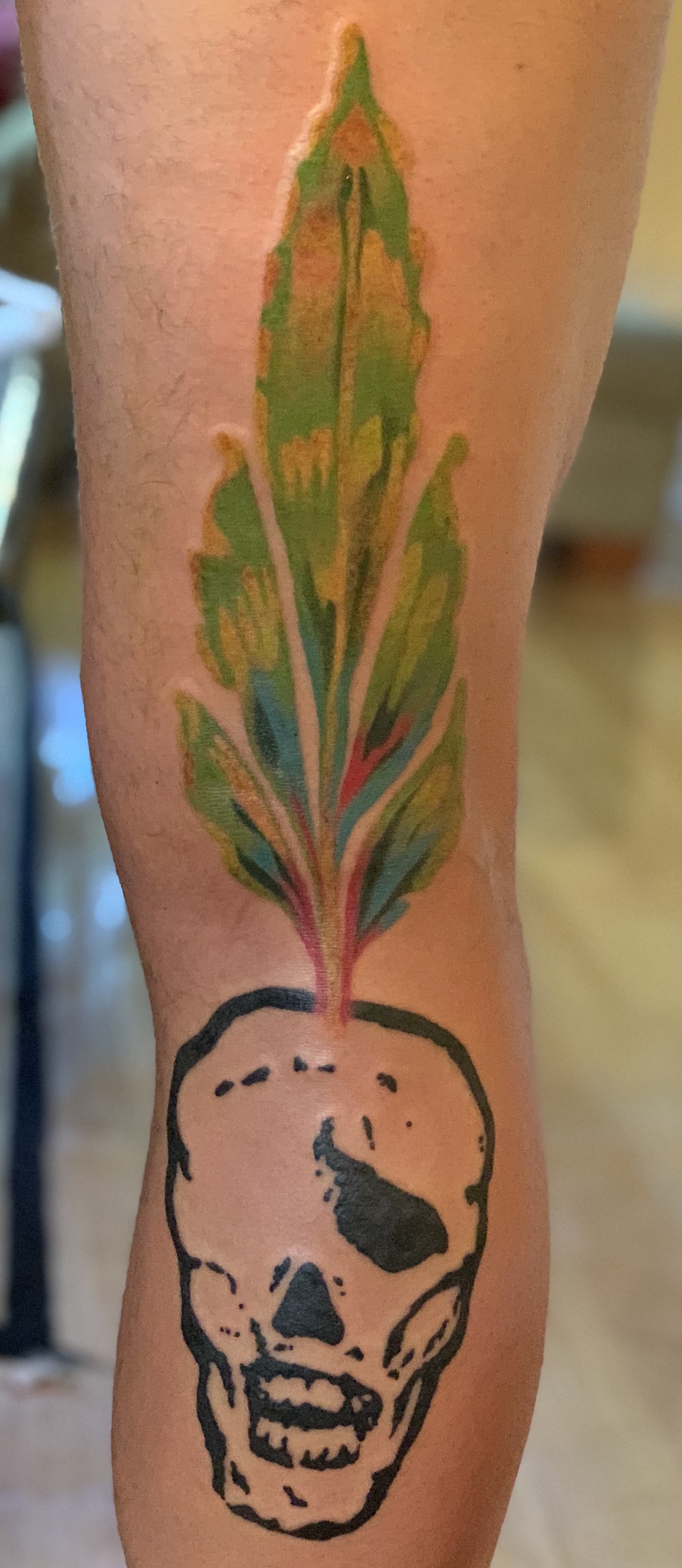Tattoo Pain

Last night I got a new tattoo on the back of my calf and thigh, as well as, crucially, a big chunk on the back of the knee. The experience drove home, in a physical way, a point that I’ve been learning over and over again recently - that the only way past pain is through it.
The thing about the back of the knee is that it’s a very delicate area. The pain from a heavy amount of ink there feels like two extremely strong and unpleasant pains at once - one of a normal tattoo gun, and another of much deeper nerve pain. Everything in your brain is screaming at you to make it stop, even while you’re promising yourself that everything is OK, and that this is what you’ve chosen to do.
I tried two methods to get through it. The first was to try to bring in some of the meditation techniques I’ve been learning recently (I wrote about them here). Specifically, I focused on the sensations of breath in my nose, and attempted to exclude all other sensation and thought.
…
I’m here to tell you that this was a mistake. The effort was tremendous, the mental energy required was orders of magnitude higher than what I had available, and as a result it made everything worse. My muscles tensed, my heart rate rose, the pain overrode my resolve in half a minute. This technique was a lot more viable before we got to the back of the knee; although even then it wasn’t great. But especially in this more sensitive area, there was no way this would work.
Then I had a new idea, which in retrospect is obvious, but just in case it isn’t I really wanted to write it down here. I focused exclusively on the pain. John Yates mentions in The Mind Illuminated that the meditation object doesn’t have to be the breath; that it can be anything. Well in this case it was the pain, which, let me tell you, is a very effective object for focused attention. It overrides everything else in your brain to a psychedelic degree. When I was able to really, truly focus on the pain, inhabit it, send my consciousness into it, become it, and shut everything else out, it didn’t really feel like pain anymore at all.
Time slowed down - I felt every individual impact of the needle gun, multiple times per second. I was dissociated from the rest of my consciousness, which is to say, a large proportion of my consciousness became the pain. At times various subsystems in my consciousness were still screaming at me to stop, to turn away, to distract myself, to ask my tattoo artist to stop, to at least enjoy the breaks in between lines of ink, but I (mostly successfully) used the mental power I’ve been building through my meditation practice to deliberately turn down all of these temptations. Every time I felt my resolve wavering, I doubled down on focusing directly and exclusively on the sensations of pain in the back of my knee. And that made all the difference. My brain broke just a little bit - but in a way that feels empowering. As if I’d conquered or tamed a piece of my brain that had been in control of me for my entire life.
The negative aspect of pain doesn’t come from the affected body part, it comes from the brain - from the evolutionary pressure to not hurt the organism, written into some of the deepest sections of our brains. And even with pain at a 10 on my personal scale, which is to say, the worst I’ve ever felt, I was able at times to get past the pain and examine the root of the discomfort, which is the fear of damage to the organism, and not the pain itself. And that’s all there is to it, although I have a feeling knowing this rationally, reading it in an essay, will not have the same effect as experiencing it as I’ve described above.
In looking around online while thinking about this post, I came across an interesting person who wrote an interesting essay on the topic. Charles Eisenstein (socialist, buddhist, essayist) writes in Pain - a call for attention that
“…negative emotions are not obstacles, they are symptoms of obstacles. Let us not commit the error of treating the symptom and not the cause.”
He does a great job of unifying the ideas of dealing with physical and emotional pain. The whole idea of treating our problems’ causes and not their symptoms is a classic refrain at this point, so I won’t go that much further into it - I’ll only say that my experience with the tattoo last night was an urgent example of just how true it is from an immediately physicaly perspective. Whether you feel like indulging in addictive / distractive behaviors because your body parts hurt, or because your emotions hurt, it might be more effective to take some time and sit with the negative feelings, and let them have whatever effect on you they may. If you move towards the pain, if you inhabit it and communicate with it instead of shutting it out, you might end up learning and healing its very cause.